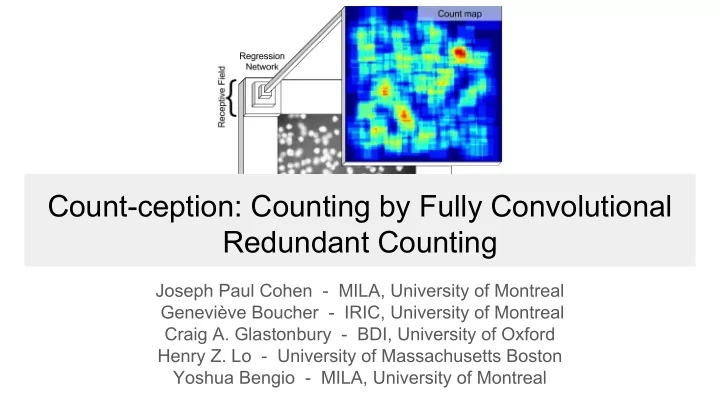

Count-ception: Counting by Fully Convolutional Redundant Counting Joseph Paul Cohen - MILA, University of Montreal Geneviève Boucher - IRIC, University of Montreal Craig A. Glastonbury - BDI, University of Oxford Henry Z. Lo - University of Massachusetts Boston Yoshua Bengio - MILA, University of Montreal
Count what? People Sea lions Cells Penguins Cars
Cell growth studies Treat cells with different compounds and observe proliferation
Cell growth studies Bachstetter, MW151 Inhibited IL-1? Levels after Traumatic Brain Injury with No Effect on Microglia Physiological Responses, PLOS ONE, 2017
Cell growth studies At the Cell Counter: THP-1 Cells, Molecular Devices https://www.moleculardevices.com/cell-counter-thp-1-cells
Complicated cell structure MBM Dataset Bone marrow, H&E stained. Healthy cells Obtained from TCGA 44 images, 126 ± 33 cells
Complicated cell structure MBM Dataset Bone marrow, H&E stained. Healthy cells Obtained from TCGA 44 images, 126 ± 33 cells
Cell counting = State of practice 1. Create binary segmentation image 2. Watershed segmentation 3. Isolate and count
Cell counting = State of practice 1. Create binary segmentation image 2. Watershed segmentation 3. Isolate and count
Cell counting = State of practice 1. Create binary segmentation image 2. Watershed segmentation 3. Isolate and count
Cell counting = State of practice 1. Create binary segmentation image 2. Watershed segmentation 3. Isolate and count
Cell counting = State of practice 1. Create binary segmentation image 2. Watershed segmentation 3. Isolate and count
Cell counting W. Xie, J. A. Noble, and A. Zisserman, “Microscopy cell counting and detection with fully convolutional regression networks,” 2016. V. Lempitsky and A. Zisserman, “Learning To Count Objects in Images,” 2010.
Redundant Counting Gaussian Kernel [Lempitsky and Zisserman 2010] Square Kernel [Cohen et al. 2017] Square kernel size matches the receptive field!
Cell counting = State of research Receptive field Gaussian Kernel [Lempitsky and Zisserman 2010]
Receptive Field Small example
Cell counting = State of research 0.5 Gaussian Kernel [Lempitsky and Zisserman 2010]
Cell counting = State of research 0.2 Gaussian Kernel [Lempitsky and Zisserman 2010]
Cell counting = State of research 0.0 Gaussian Kernel [Lempitsky and Zisserman 2010]
Cell counting = State of research 1.0 Gaussian Kernel Square Kernel [Lempitsky and Zisserman 2010] [Cohen et al. 2017]
Cell counting = State of research 1.0 Square Kernel [Cohen et al. 2017]
Cell counting = State of research 1.0 Square Kernel [Cohen et al. 2017]
Why not increase the variance of the gaussian? σ = 8 σ = 32 σ = 1 σ = 16 σ = 64
Why not increase the variance of the gaussian? 0.1 σ = 8 σ = 32 σ = 1 σ = 16 σ = 64
Why not increase the variance of the gaussian? σ = 1
Why not increase the variance of the gaussian? σ = 1
Why not increase the variance of the gaussian? σ = 1
Why not increase the variance of the gaussian? σ = 1
Why not increase the variance of the gaussian? σ = 1
Count-ception Architecture
Count-ception Architecture
Fully Convolutional Training L1 regression error Effective batch size 82,082 patches No pooling or strides Easy calculation of receptive field!
Does redundant counting help? Increasing the stride reduces the number of regression targets
N = Number of train and validation samples
N = Number of train and validation samples
Count-ception applied to tissue cells Craig Glastonbury - Big Data Institute - University of Oxford Challenges: + Adjoining neighbors + Complex cell structure + Few non-cell regions
N = Number of train and validation samples
Counting fungal spores
Count sea lions Kaggle sea lion challenge (37th place) Implemented by Robin Dinse (Universität Koblenz-Landau)
Do you need to count things? Joseph Paul Cohen joseph@josephpcohen.com arXiv: https://arxiv.org/abs/1703.08710 Site: https://github.com/ieee8023/countception Source Code: Lasagne + Theano https://github.com/ieee8023/countception Karas https://github.com/fizzoo/countception-recreation TensorFlow https://github.com/rdinse/sea-lion-counter PyTorch https://github.com/rwightman/pytorch-countception-sealion
ShortScience.org Joseph Paul Cohen Henry Z Lo Swami Iyer Supported by:
What is it and why? A platform for post-publication discussion with over 800 public summaries in machine learning written by the community! Browse summaries for a paper Browse by venue
Goal - Accelerate Science Programmatic organization of summaries and notes ● Speed up the literature review process ● Increase the number of active researchers ● Decrease the barriers to understand and improve on concepts ● Conferences ArXiv ShortScience.org
Recommend
More recommend